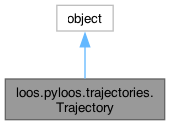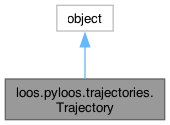Python-based wrapper for LOOS Trajectories This class turns a loos Trajectory into something more python-like. More...
Inheritance diagram for loos.pyloos.trajectories.Trajectory:

Collaboration diagram for loos.pyloos.trajectories.Trajectory:

Public Member Functions | |
| __init__ (self, fname, model, **kwargs) | |
| Instantiate a Trajectory object. | |
| stride (self, n) | |
| skip (self, n) | |
| fileName (self) | |
| setSubset (self, selection) | |
| __iter__ (self) | |
| __len__ (self) | |
| reset (self) | |
| __next__ (self) | |
| nextFrame (self) | |
| trajectory (self) | |
| model (self) | |
| readFrame (self, i) | |
| frame (self) | |
| realIndex (self) | |
| index (self) | |
| frameNumber (self, i) | |
| __getitem__ (self, i) | |
Protected Member Functions | |
| _initFrameList (self) | |
| _getSlice (self, s) | |
Protected Attributes | |
| _skip | |
| _stride | |
| _iterator | |
| _subset | |
| _model | |
| _fname | |
| _traj | |
| _stale | |
| _framelist | |
| _index | |
Detailed Description
Python-based wrapper for LOOS Trajectories This class turns a loos Trajectory into something more python-like.
Behind the scenes, it wraps a loos::AtomicGroup and a loos::Trajectory. The behavior of the trajectory can be controlled through passed keywords,
| Keyword | Description |
|---|---|
| skip=n | Skip the first n-frames of the wrapped trajectory |
| stride=n | Step through the wrapped trajectory n-frames at a time |
| iterator=i | Use the python iterator object i to select frames from the wrapped trajectory |
| subset=s | Use 's' to select a subset of the model to use for each frame |
Remember that all atoms are shared. If you want to decouple the trajectory from other groups, pass it a copy of the model.
examples:
model = loos.createSystem('foo.pdb')
traj = loos.pyloos.Trajectory('foo.dcd', model)
calphas = loos.selectAtoms(model, 'name == "CA"')
for frame in traj:
print calphas.centroid()
Python-based wrapper for LOOS Trajectories This class turns a loos Trajectory into something more pyt...
Definition trajectories.py:55
AtomicGroup selectAtoms(const AtomicGroup &source, const std::string selection)
Applies a string-based selection to an atomic group...
Definition utils.cpp:183
AtomicGroup createSystem(const std::string &filename)
Factory function for reading in structure files.
Definition sfactories.cpp:117
The same thing but skipping the first 50 frames and taking every other frame
traj = loos.pyloos.Trajectory('foo.dcd', model, skip=50, stride=2)
Only use frames 19-39 (i.e. the 20th through 40th frames)
traj = loos.pyloos.Trajectory('foo.dcd', model, iterator=range(19,40))
An alternative way of only iterating over a subset...
model = loos.createSystem('foo.pdb')
Decouple the model stored in the trajectory,
traj = loos.pyloos.Trajectory('foo.dcd', model.copy())
Python-based wrapper for LOOS Trajectories
>>> model = loos.createSystem('foo.pdb')
>>> traj = loos.pyloos.Trajectory('foo.dcd', model)
keyword args:
skip = # of frames to skip from start
stride = # of frames to step through
iterator = Python iterator used to pick frame (overrides skip and stride)
subset = Selection used to pick subset for each frame
See the Doxygen documentation for more details.
Member Function Documentation
◆ __getitem__()
| loos.pyloos.trajectories.Trajectory.__getitem__ | ( | self, | |
| i ) |
Handle array indexing and slicing. Negative indices are relative to the end of the trajectory
◆ __len__()
| loos.pyloos.trajectories.Trajectory.__len__ | ( | self | ) |
Number of frames in the trajectory
◆ fileName()
| loos.pyloos.trajectories.Trajectory.fileName | ( | self | ) |
Return the filename that this Trajectory represents
◆ frame()
| loos.pyloos.trajectories.Trajectory.frame | ( | self | ) |
Return the current frame (subset)
◆ frameNumber()
| loos.pyloos.trajectories.Trajectory.frameNumber | ( | self, | |
| i ) |
Returns the real frame numbers corresponding to the passed indices. Can accept
either an integer or a list of integers.
For example:
>>> t = loos.pyloos.Trajectory('foo.dcd', model, skip=50)
>>> t.frameNumber(0)
50
>>> t.frameNumber(range(0,2))
[50, 51]
◆ index()
| loos.pyloos.trajectories.Trajectory.index | ( | self | ) |
The state of the iterator
◆ model()
| loos.pyloos.trajectories.Trajectory.model | ( | self | ) |
Return the current model
◆ nextFrame()
| loos.pyloos.trajectories.Trajectory.nextFrame | ( | self | ) |
Return the next frame in the trajectory, or False. Intended for use in a while loop: while traj.nextFrame(): do_something
◆ readFrame()
| loos.pyloos.trajectories.Trajectory.readFrame | ( | self, | |
| i ) |
Read a frame and update the model
◆ realIndex()
| loos.pyloos.trajectories.Trajectory.realIndex | ( | self | ) |
The 'real' frame in the trajectory for this index
◆ reset()
| loos.pyloos.trajectories.Trajectory.reset | ( | self | ) |
Reset the iterator
◆ setSubset()
| loos.pyloos.trajectories.Trajectory.setSubset | ( | self, | |
| selection ) |
Set the subset used when iterating over a trajectory. The selection is a LOOS selection string.
◆ skip()
| loos.pyloos.trajectories.Trajectory.skip | ( | self, | |
| n ) |
Skip this number of frames at the start of the trajectory
◆ stride()
| loos.pyloos.trajectories.Trajectory.stride | ( | self, | |
| n ) |
Step through the trajectory by this number of frames
◆ trajectory()
| loos.pyloos.trajectories.Trajectory.trajectory | ( | self | ) |
Access the wrapped loos.Trajectory
The documentation for this class was generated from the following file:
- loos/src/loos/pyloos/trajectories.py